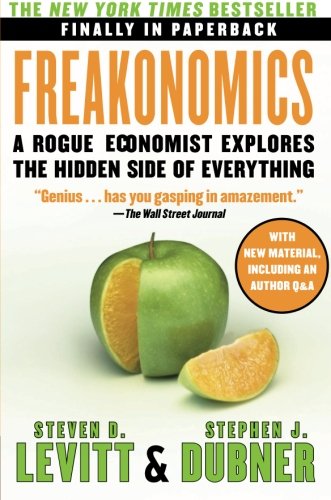
Which is more dangerous, a gun or a swimming pool?
What do schoolteachers and sumo wrestlers have in common?
How much do parents really matter?
These may not sound like typical questions for an economist to ask. But Steven D. Levitt is not a typical economist. He studies the riddles of everyday life—from cheating and crime to parenting and sports—and reaches conclusions that turn conventional wisdom on its head.
Freakonomics is a groundbreaking collaboration between Levitt and Stephen J. Dubner, an award-winning author and journalist. They set out to explore the inner workings of a crack gang, the truth about real estate agents, the secrets of the Ku Klux Klan, and much more.
Through forceful storytelling and wry insight, they show that economics is, at root, the study of incentives—how people get what they want or need, especially when other people want or need the same thing.
Economics is not widely considered to be one of the sexier sciences. The annual Nobel Prize winner in that field never receives as much publicity as his or her compatriots in peace, literature, or physics. But if such slights are based on the notion that economics is dull, or that economists are concerned only with finance itself, Steven D. Levitt will change some minds. In Freakonomics (written with Stephen J. Dubner), Levitt argues that many apparent mysteries of everyday life don’t need to be so mysterious: they could be illuminated and made even more fascinating by asking the right questions and drawing connections. For example, Levitt traces the drop in violent crime rates to a drop in violent criminals and, digging further, to the Roe v. Wade decision that preempted the existence of some people who would be born to poverty and hardship. Elsewhere, by analyzing data gathered from inner-city Chicago drug-dealing gangs, Levitt outlines a corporate structure much like McDonald’s, where the top bosses make great money while scores of underlings make something below minimum wage. And in a section that may alarm or relieve worried parents, Levitt argues that parenting methods don’t really matter much and that a backyard swimming pool is much more dangerous than a gun. These enlightening chapters are separated by effusive passages from Dubner’s 2003 profile of Levitt in The New York Times Magazine, which led to the book being written. In a book filled with bold logic, such back-patting veers Freakonomics, however briefly, away from what Levitt actually has to say. Although maybe there’s a good economic reason for that too, and we’re just not getting it yet. –John Moe
Product Features
- Freakonomics
- Economist
- Everything

An uncritical book The scientific fidelity of social science is a topic of heated contention in academics. Steven Levitt and Stephen Dubner have successfully brought this debate to the mainstream in the form of their joint book, Freakonomics. But do they make a strong case for validating statistical analyses of an infinitely complex human society?As any statistician will tell you, one of the major pitfalls of their field is the confusion of correlation and causation. Just because X and Y have similar…
An Entertaining Lesson on Breaking Out of the Mold This book succeeds at analyzing sociological developments in a way that is entertaining because Steven Levitt, an economist who strays from convention, has a knack for unpeeling layers and layers of assumptions and myth and showing the real causes behind trends. He shows, to name some examples, how our names affect our career paths; how abortion and the crime rate are related; how a man used his cunning to humiliate the Klu Klux Klan rather than rely on conventional methods; how easy it is to…
A less dismal side of economics Steven Levitt, an economist at U Chicago, is less interested in numbers and more interested in why people turn out the way they do. He examines the influence of incentive, heredity, the neighborhood you grew up in, etc.Some of his conclusions are less than earth-shattering. For example, African-American names (DeShawn, Latanya) don’t influence African-American test performance. As a second example, Levitt compiled data regarding online dating websites and concluded that bald men and…